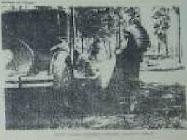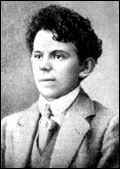I've been offering Rest Note read-alongs, so I thought I'd add some emergency obscurity relief comments on the section just posted (#14).
In line with the alternation/ABA/ring-structure I described in previous read-alongs, there's a link between # 14 and a previous section, # 6 (posted here previously, & also over at Alephoebooks).
The ideas cluster around the word "seal". In poem #6, there's an allusion to the royal seal which Hamlet used, on board ship, to outwit his uncle's plan to have him executed. The first stanza of #14 (see below) is a fairly literal description of the Minnesota State Seal (a farmer, plowing, looks over shoulder at Sioux horseman, galloping away). In the background here, too, is Stevens' great late poem, "An Old Man Asleep" - "...the redness of the River R").
Teddy Roosevelt, as recounted in the C. Millard book, dated his own powerful interest in natural history to a childhood visit to the NYC fish market, where he saw a dead baby seal on a plank (I think I've got that right).
So I'm punning on seal - as natural fact, curiosity - and as insignia, representation of authority. Nature (natural law) & custom (positive law).
I understand this is a huge stretch - I mean more in my head than in the poem, as yet.
So what do I mean by the "seal"? It's the "character" - the "type" (as in typesetting) forged by Vulcan (volcanic) fire. It's nature's mortal seal on the particularity of each living creature. Thus the subdued allusions in #14 to Hart Crane's poem "Emblems of Conduct", as well as to Wordsworth's great brief poem which begins "A slumber did my spirit seal". These are in the background here.
Lurking on another level are allusions to Mandelstam & his "emblematic" encounter with Stalin ("wolf-meal" - links an Old English lament & Mandelstam poem about exile; "'star' for star", etc.). The "House of Ice" in #6 is a kind of satire on tyranny as traditional political status quo. Nabokov also lurks in the poem posted previously - #13 (see if you can find him). What I'm groping toward, actually, is a rather Nabokovian notion of a spiritual otherworld, which balances "this" world by means of enigmatic, emblematic, writerly tokens, insignia (cf. that other Hamletian Stephen Dedalus, in Ulysses - "signatures of all things I am here to read", or so it goes, something like that...) (p.s Happy Bloomsday, JayJay, & H.C. Everybody).
(This Nabokov thing runs very deep in me. It comes, I think, from his strong influence on my reading when I was around 13-14. There is a kind of subconscious melding of the vocation of writer with the spirit of Nabokov in my mind : & that, perhaps, is the ghostly imprint of his "character". But I digress...)
There is a sort of continuum being set up between social power (the freight train & its long echo imprinted on the night), TR's presidency as a social symbol, and Crane's symbolic death (becoming "one with the fishes") - going back to the conjunction noted between the date of TR's emergence from the jungle, & the date of Crane's death.
The vague notion presented in these lines is that of a duality between the "body left with Calypso" and, on the other hand, the homing spirit of Ulysses. What remains of the body is an emblem (the "jasper bandolier") - which in turn echoes the "banderole" - the symbolic curtain dividing heaven & earth - mentioned (& noted in the notes) in the opening poem (#1).
It's obvious from these notes that I'm describing an ongoing process of symbolization, which hopefully will become more exact & clear in sections to come... then again, much of the iceberg, in my particular house of ice, remains underwater, implicit - & that's as it should be.
6.16.2006
Labels:
Joyce,
Mandelstam,
Minnesota,
natural law,
read-along,
Rest Note3,
royal seal,
Stalin,
TR
Subscribe to:
Post Comments (Atom)



No comments:
Post a Comment